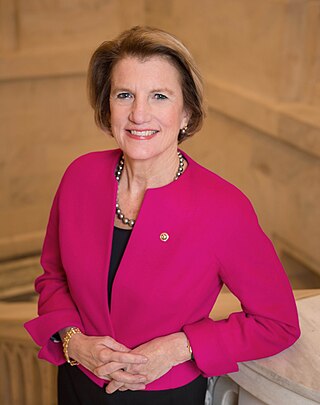
Shelley Wellons Moore Capito is an American politician and retired educator serving in her second term as the junior United States senator from West Virginia, a post she has held since 2015. A member of the Republican Party, Capito served seven terms as the U.S. representative from West Virginia's 2nd congressional district from 2001 to 2015. The daughter of three-term West Virginia governor Arch Alfred Moore Jr., she is the dean of West Virginia's congressional delegation.

Patrick Joseph Tiberi is an American lobbyist and politician who served as the U.S. representative for Ohio's 12th congressional district from 2001 to 2018. His district included communities north and east of Columbus. He is a member of the Republican Party, and previously served in the Ohio House of Representatives from 1993 to 2000. He briefly served as Chair of the new Republican Main Street Congressional Caucus from September 7, 2017.
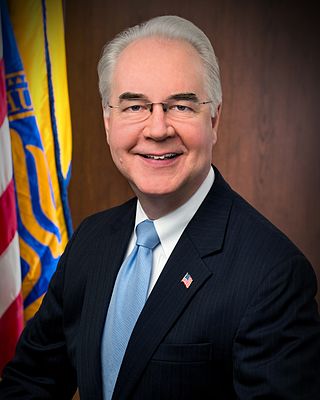
Thomas Edmunds Price is an American physician and Republican Party politician who served as the U.S. representative for Georgia's 6th congressional district, encompassing the northern suburbs of Atlanta, from 2005 to 2017. While in Congress, Price chaired the House Committee on the Budget, Republican Study Committee and Republican Policy Committee. He was appointed Secretary of Health and Human Services by President Donald Trump and served in that role from February to September 2017.

Dean Arthur Heller is an American businessman and politician who served as a United States senator representing Nevada from 2011 to 2019. A member of the Republican Party, he served as the 15th secretary of state of Nevada from 1995 to 2007 and U.S. representative for Nevada's 2nd congressional district from 2007 to 2011. He was appointed to the U.S. Senate by Governor Brian Sandoval and elected to a full term in the 2012 election. Heller unsuccessfully ran for a second term in 2018, losing to Democrat Jacky Rosen. He was an unsuccessful candidate for governor of Nevada in 2022.
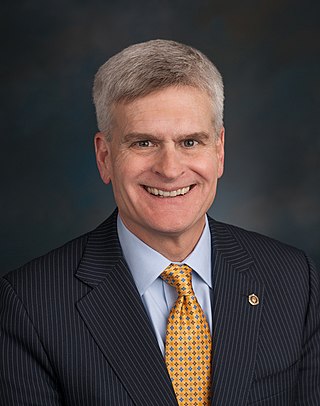
William Morgan Cassidy is an American physician and politician serving as the senior United States senator from Louisiana, a seat he has held since 2015. A member of the Republican Party, he served in the Louisiana State Senate from 2006 to 2009 and in the U.S. House of Representatives from 2009 to 2015.

The Affordable Care Act (ACA), formally known as the Patient Protection and Affordable Care Act (PPACA) and colloquially known as Obamacare, is a landmark U.S. federal statute enacted by the 111th United States Congress and signed into law by President Barack Obama on March 23, 2010. Together with the Health Care and Education Reconciliation Act of 2010 amendment, it represents the U.S. healthcare system's most significant regulatory overhaul and expansion of coverage since the enactment of Medicare and Medicaid in 1965.

The political positions of Paul Ryan, the U.S. representative from Wisconsin's 1st congressional district from 1999 to 2019 and the 54th speaker of the United States House of Representatives from 2015 to 2019, were generally conservative, with a focus on fiscal policy. Ryan was Chairman of the House Budget Committee from 2011 to 2015 and of Ways and Means in 2015. Ryan was the Republican nominee for Vice President as the running mate of Mitt Romney in the 2012 presidential election.

The Exchange Information Disclosure Act is a bill that would require the United States Department of Health and Human Services to submit weekly reports to Congress about how many people are using HealthCare.gov and signing up for health insurance. These reports would be due every Monday until March 31, 2015, and would be available to the public. The bill would "require weekly updates on the number of unique website visitors, new accounts, and new enrollments in a qualified health plan, as well as the level of coverage," separating the data by state. The bill would also require reports on efforts to fix the broken portions of the website.

Rodney Leland Blum is an American businessman and politician who served as the U.S. representative for Iowa's 1st congressional district from 2015 to 2019. A member of the Republican Party, he was first elected in 2014 and won a second term in the 2016 elections.
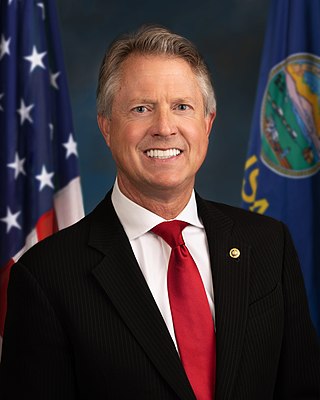
Roger Wayne Marshall is an American politician, physician, and former military officer serving as the junior United States senator from Kansas since 2021. A member of the Republican Party, he served from 2017 to 2021 as the U.S. representative for Kansas's 1st congressional district, a mostly rural district covering much of the western and northern parts of the state.
The 2017 United States federal budget is the United States federal budget for fiscal year 2017, which lasted from October 1, 2016 to September 30, 2017. President Barack Obama submitted a budget proposal to the 114th Congress on February 9, 2016. The 2017 fiscal year overlaps the end of the Obama administration and the beginning of the Trump administration.
The following is a list of efforts to repeal the Affordable Care Act, which had been enacted by the 111th United States Congress on March 23, 2010.

The American Health Care Act of 2017 was a bill in the 115th United States Congress. The bill, which was passed by the United States House of Representatives but not by the United States Senate, would have partially repealed the Affordable Care Act (ACA).
The "Jimmy Kimmel test" is a political litmus test used in political discourse in the United States during 2017 efforts to repeal the Affordable Care Act. First proposed by United States Senator Bill Cassidy, the test was used throughout 2017 to frame political debate over health care reform, and Cassidy's use of it in September 2017 prompted comedian and late-night talk show host Jimmy Kimmel to publicly attack a Senate health care bill co-sponsored by Cassidy. The resulting public debate contributed to the failure of the Senate bill.

Graham–Cassidy or Graham–Cassidy–Heller–Johnson is the common name for Senate Amendment 1030 to the American Health Care Act of 2017. S.Amdt. 1030 was introduced on September 13, 2017, sponsored by Lindsey Graham (R-SC), with Bill Cassidy (R-LA) as a co-sponsor, after whom the amendment is named. The other three co-sponsors are Dean Heller (R-NV), Ron Johnson (R-WI), and Roy Blunt (R-MO). The amendment would repeal the Affordable Care Act (ACA), also known as Obamacare. It would also return control of the Medicaid program to the states and cap the program's funding. The amendment would also redistribute federal money differently to different states, with some states that expanded Medicaid under the ACA losing federal money to states that did not.

The Executive Order Promoting Healthcare Choice and Competition, also known as the Trumpcare Executive Order, or Trumpcare, is an Executive Order signed by Donald Trump on October 12, 2017, which directs federal agencies to modify how the Patient Protection and Affordable Care Act of the Obama Administration is implemented. The order included a directive to federal agencies to end rules forbidding employers from using health reimbursement arrangements (HRAs) to pay individual insurance premiums.
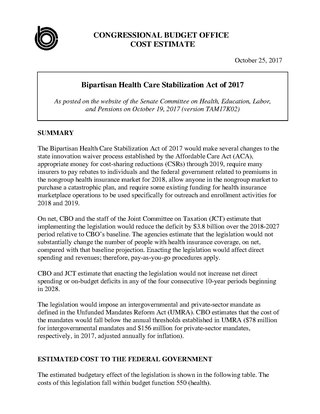
The Bipartisan Health Care Stabilization Act of 2017 was a 2017 proposed compromise reached by senator and HELP Committee chairman Lamar Alexander and senator and HELP Committee ranking member Patty Murray to amend the Affordable Care Act to fund cost-sharing reductions subsidies. The plan will also provide more flexibility for state waivers, allow a new "Copper Plan" or catastrophic coverage for those under 30, allow interstate insurance compacts, and redirect consumer fees to states for outreach. President Trump had stopped paying the cost sharing subsidies and the Congressional Budget Office estimated his action would cost $200 billion, cause insurance sold on the exchange to cost 20% more and cause one million people to lose insurance.
The cost sharing reductions (CSR) subsidy is the smaller of two subsidies paid under the Patient Protection and Affordable Care Act (ACA) as part of the healthcare system in the United States. The subsidies were paid from 2013 to 2017 to insurance companies on behalf of eligible enrollees in the ACA to reduce co-payments and deductibles. They were discontinued by President Donald Trump in October 2017. The nature of the subsidy as discretionary spending versus mandatory was challenged in court by the Republican-controlled House of Representatives in 2014, although payments continued when the ruling in favor of the GOP was appealed by the Obama administration. The non-partisan Congressional Budget Office (CBO) estimated that ending the payments would increase insurance premiums on the ACA exchanges by around 20 percentage points, resulting in increases in the premium tax credit subsidies, thereby adding nearly $200 billion to the budget deficits over the following decade. Critics argued the decision was part of a wider strategy to "sabotage" the ACA.
The Patient Protection and Affordable Care Act, often shortened to the Affordable Care Act (ACA) or nicknamed Obamacare, is a United States federal statute enacted by the 111th United States Congress and signed into law by President Barack Obama on March 23, 2010. Together with the Health Care and Education Reconciliation Act of 2010 amendment, it represents the U.S. healthcare system's most significant regulatory overhaul and expansion of coverage since the passage of Medicare and Medicaid in 1965. Once the law was signed, provisions began taking effect, in a process that continued for years. Some provisions never took effect, while others were deferred for various periods.
California v. Texas, 593 U.S. ___ (2021), was a United States Supreme Court case that dealt with the constitutionality of the 2010 Affordable Care Act (ACA), colloquially known as Obamacare. It was the third such challenge to the ACA seen by the Supreme Court since its enactment. The case in California followed after the enactment of the Tax Cuts and Jobs Act of 2017 and the change to the tax penalty amount for Americans without required insurance that reduced the "individual mandate" to zero, effective for months after December 31, 2018. The District Court of the Northern District of Texas concluded that this individual mandate was a critical provision of the ACA and that, with a penalty amount equal to zero, some or all of the ACA was potentially unconstitutional as an improper use of Congress's taxation powers.















